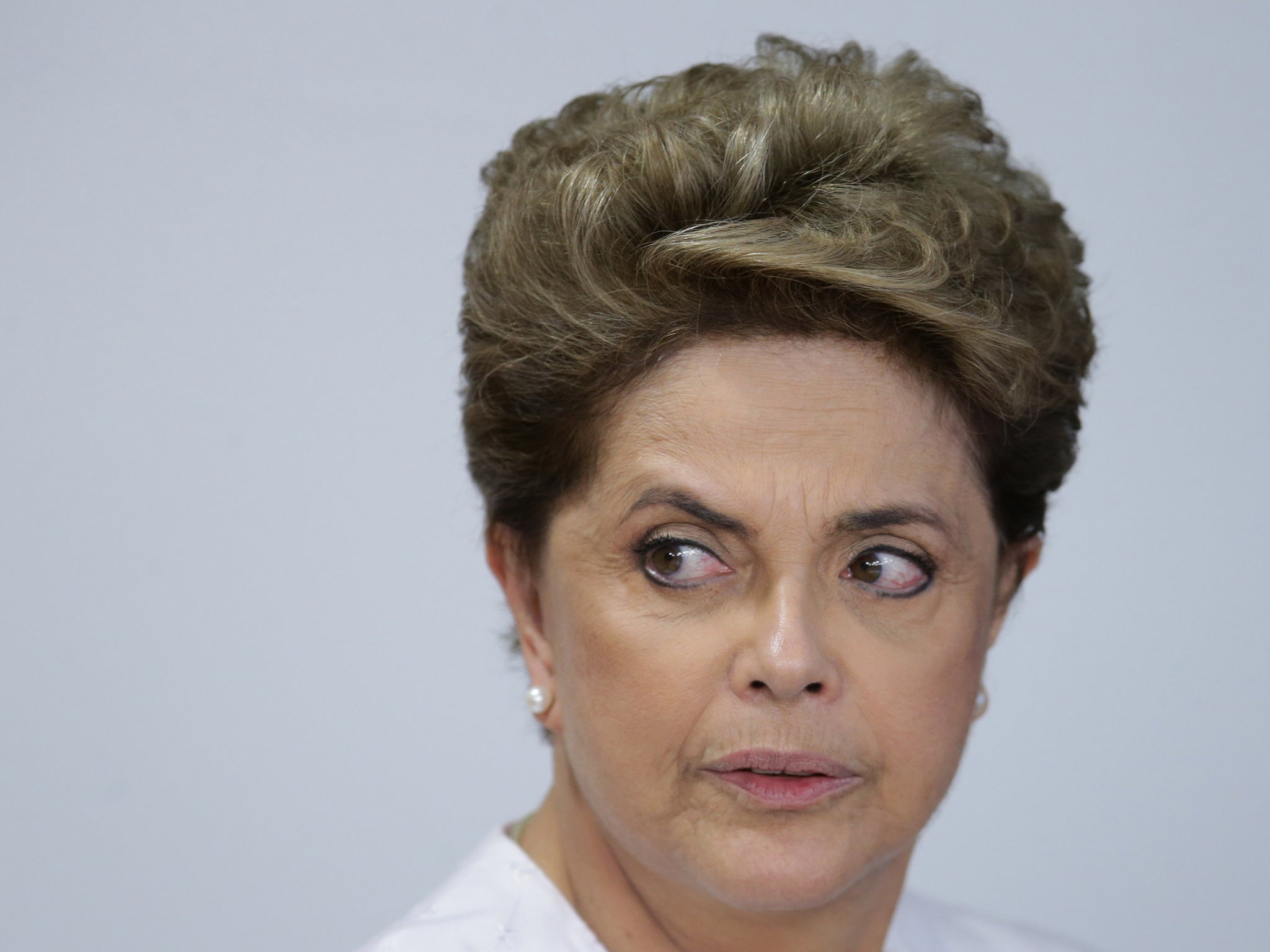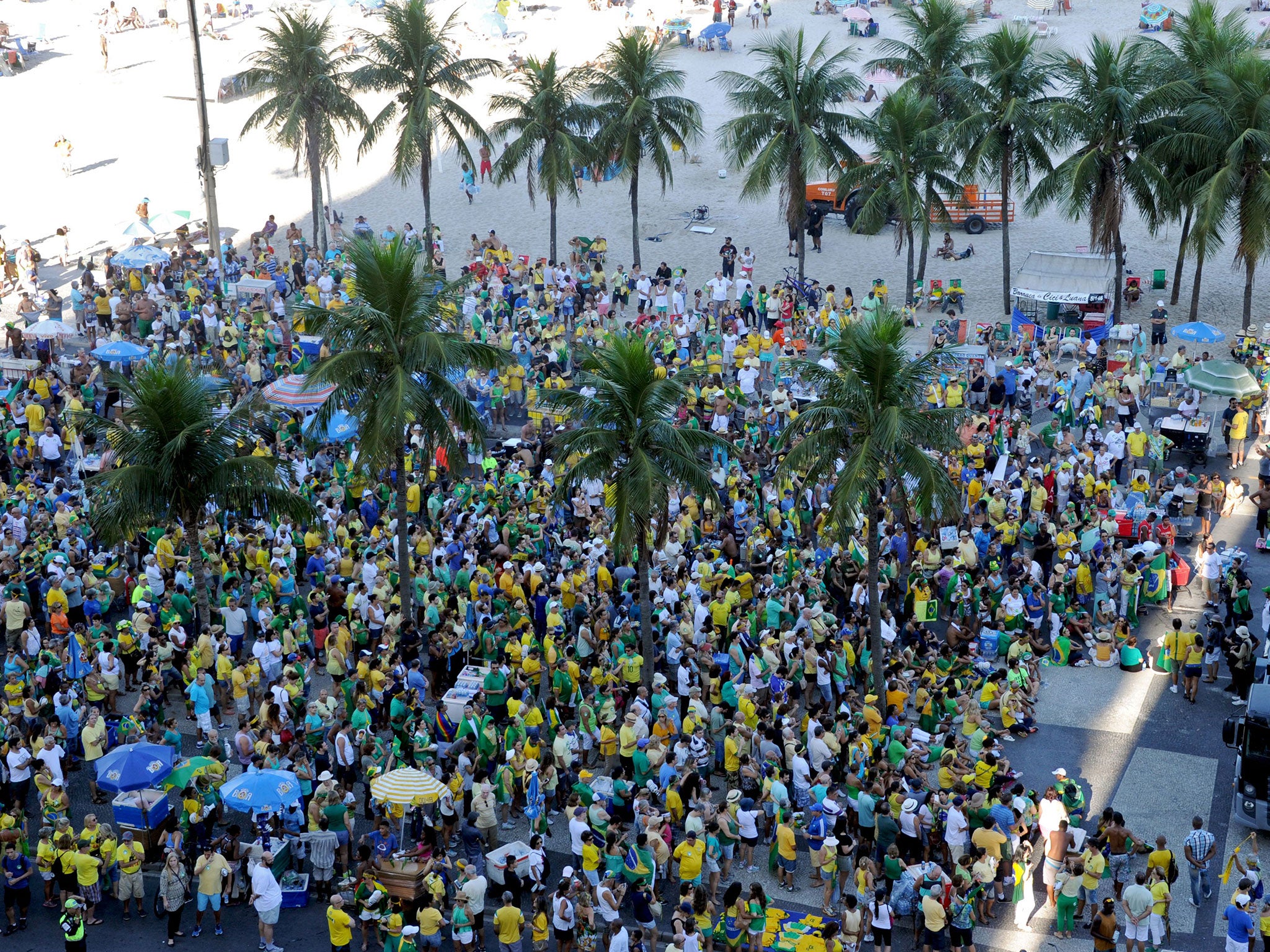Dilma Rousseff: Brazilian president suspended as Senate votes for impeachment trial
Brazil's Senate voted in favour of putting her on trial for breaking budget laws by 55 votes to 22

Your support helps us to tell the story
From reproductive rights to climate change to Big Tech, The Independent is on the ground when the story is developing. Whether it's investigating the financials of Elon Musk's pro-Trump PAC or producing our latest documentary, 'The A Word', which shines a light on the American women fighting for reproductive rights, we know how important it is to parse out the facts from the messaging.
At such a critical moment in US history, we need reporters on the ground. Your donation allows us to keep sending journalists to speak to both sides of the story.
The Independent is trusted by Americans across the entire political spectrum. And unlike many other quality news outlets, we choose not to lock Americans out of our reporting and analysis with paywalls. We believe quality journalism should be available to everyone, paid for by those who can afford it.
Your support makes all the difference.Brazil has been plunged into renewed political turnoil after the Senate voted to impeach president Dilma Rousseff.
The Senate voted in favour of putting Ms Rousseff on trial for breaking budget laws by 55 votes to 22.
The was significantly higher than the simple majority of 41 votes needed to suspend her, suggesting she will face a struggle to return to power.
Michel Temer, her vice-president, will become acting president during the trial.
Ms Rousseff, Brazil's first female president, has been accused of violating fiscal laws while closing gaps in the budget using money from state banks.
However, she denies allegations of wrongdoing, and insists that the impeachment is politically motivated.
The trial will determine whether she can serve out her second term and could last up to six months.
For her to be ousted for good, she would have to be convicted by at least a two-thirds majority of the 81-seat Senate.
The extraordinary drama has come at a time when Brazil is enduring its worst economic recession since the 1930s, thanks in part to crashing oil prices, and has been treated to a long torrent of revelations of corruption and graft connected to Petrobras, the national oil giant, that has seen numerous Worker Party figures put in prison or put under investigation.

No allegations of corruption have been leveled at Ms Rousseff, but as a former chairman of Petrobras at a time when the corruption within it was already rife, the scandal has tainted her.
“Plainly said, this is the worst crisis in our history, with its combination of economic calamity, discredited politics and the violation of the lowest ethical standards,” Boris Fausto, a Brazilian political scientist and historian, commented to reporters earlier this month.
In a statement on the Vatican’s radio website, Pope Francis voiced his concern for the situation in Latin America’s largest country and a neighbour of his own Argentina. He called for “prayer and dialogue” and said he hoped that Brazil ”proceeds on the path of harmony and peace.“
Adding to the national malaise is the medical emergency created by the fast-spreading Zika virus. In the meantime, the country is trying to galvanise itself to welcome the world to the Summer Olympic Games in August, plans for which have encountered problems of their own, not least worries about heavily polluted water threatening events like rowing.
There has been a rise recently in Brazilian markets amidst first tiny glimmers of economic recovery as well as hope that Mr Temer, whose is seen as being more pro-business than the leftist ruling party, will take steps to attack the deficit and tame public spending.
While he may be looked upon appreciatively by the business community, Mr Temer is politically deeply unpopular with only 2 per cent of voters saying they would actually choose him to lead Brazil. He also faces a monumental task getting the economy back in order, experts agree.
“Temer may enjoy a honeymoon with markets for some weeks, maybe months, but when investors come to realize that the fiscal results will not improve fast enough, then we could see some disappointment later this year,” said Bruno Lavieri, an economist with consultancy 4E, in Sao Paulo.
Analysts will be scrutinising the Senate vote to see what hope, if any, Ms Rousseff may have of surviving the trial itself. For her to be ousted for good, she would have to be convicted by at least a two-thirds majority in the 81-seat Senate. If that were to happen, Mr Temer would in theory serve out the remainder of her second term which runs until the end of 2018.
Afoot also is a retreat from power of the Workers Party which has governed Brazil, the world’s seventh largest economy, for the last 13 years. Ms Rousseff was the chosen successor of former President Luiz Inácio Lula da Silva, known simply as Lula, who ushered in a rare streak of economic growth that lifted millions out of poverty.
A rightwards shift in Brazil’s government would fit a pattern seen recently in other Latin American states, notably with the election last November of President Mauricio Macri, a free-market reformer, in Argentina and the gradual collapse of the far-left regime in Venezuela, even if for now President Nicolas Maduro still clings to power.
Brazil’s boom times, driven by high commodity prices, had already begun to fizzle by the time of the 2014 re-election campaign. Ms Rousseff is specifically accused of plundering public banks for money that was then used to disguise the national deficit. She has countered that the tactic had been used by previous presidents and that she is in fact the victim of a political “coup”.
She displayed continuing defiance on Tuesday after it became clear that there would be no more delaying the Senate vote. “I will not resign, that never crossed my mind,” Rousseff said in a speech to cheering supporters.
Mr Temer appeared to be moving swiftly to assemble this own team. He is known to have picked former central bank chief Henrique Meirelles as Finance Minister and, according to local press report, Itau Unibanco's chief economist Ilan Goldfajn as head of Brazil’s central bank.
Join our commenting forum
Join thought-provoking conversations, follow other Independent readers and see their replies
Comments